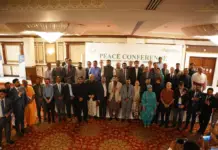As the world observes Environment Day today, Pakistan has fallen short of promises it made to take practical steps for the safety and protection of environment.
World Environment Day 2022 is being celebrated with ‘Only One Earth’ as the theme, focussing on ‘Living Sustainably in Harmony with Nature’, as it calls for collective, transformative action on a global scale to celebrate, protect and restore our planet.
The first World Environment Day was observed with the same slogan 50 years ago.
According to the United Nations, the world is facing three major environmental crises: climate change, loss of biodiversity and nature and pollution, all of which are driven by human activity and unsustainable patterns of consumption and production where the world’s most vulnerable communities are often the hardest hit.
The situation in Pakistan is getting worse with each passing day. The issues like air pollution, water pollution, deforestation, solid waste and land pollution have become the major challenges for the authorities.
Punjab, the largest province of the country with over 55 percent population, is facing numerous environmental issues, posing a grave threat to the people’s health.
It’s not a matter of a couple of years, at least for the last two decades the continuity in environmental degradation has made the situation more vulnerable. But the authorities concerned seem to be least concerned to address the issue.
The prime authority to control environmental degradation in the province – the Punjab Environmental Protection Department (EPD) – proved a failure as it had allowed thousands of industrial units to pollute environment. Moreover, its officials remained reluctant to take any action against industrial units flouting rules.
According to a recent audit conducted by the Ministry of Climate Change, it was observed that the EDP had failed to take action against over 4,000 industrial units which were found violating rules. These industrial units were found emitting toxic smoke from their chimneys while they were also disposing of untreated wastewater in water channels.
Lahore, Gujranwala, Faisalabad, Sheikhupura, Sialkot, Rahim Yar Khan, Multan and Rawalpindi are the districts where pollution level has increased during the last decade.
Deforestation is also one of the major issues in Punjab where thousands of acres of forests have vanished at the hands of powerful mafias. Hundreds of acres of agricultural land have been destroyed to build housing societies and commercial projects.
Experts believe that the decrease in green cover and deforestation have given rise to ‘heat islands’.
Heat islands are urbanized areas that experience higher temperatures than outlying areas. Structures such as buildings, roads, and other infrastructure absorb and re-emit the sun’s heat more than natural landscapes such as forests and water bodies.
They say that the best way out of this dilemma is to “transform our economies and societies to make them inclusive, fair and more connected with nature”.
Experts say that this may only be possible if we shift from harming the planet to healing it.







